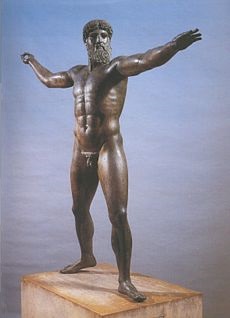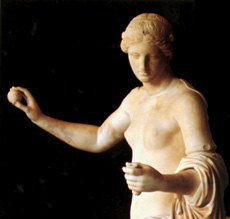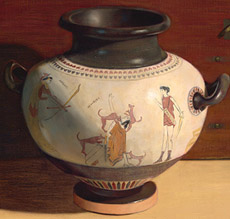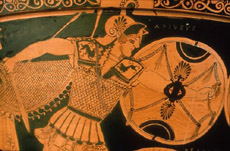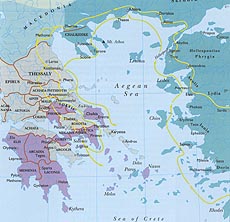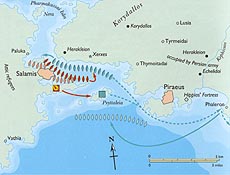Ancient Greece
These books outline the magnificent Greek achievement. They appear in a suggested order of reading , starting with some basic surveys of Greek history and culture, then introducing art to help concretize the Greek worldview, then moving to histories and other works in chronological order. Some of these books are in print, but others will require finding copies at a library or through a used book source. To keep the reading manageable, I have omitted many other valuable books, though as my own knowledge increases I may edit this list.
The difference between original evidence of Greek thought and later analysis and conjecture is significant. In this list, original Greek works are indicated by a solid bullet, modern works by a hollow bullet. In addition to the original works in this basic list, a more complete list of original works appears later in this page.
- The History of Ancient Greece in 2 minutes – The entire history of Ancient Greece is summarized in this 2-minute video by Scott Powell.
- Why Ancient Greece is My Favorite Civilization by Leonard Peikoff. A motivating video identifying the essential characteristics of Ancient Greece. Also issued as an audio tape.
- A Short History of Ancient Times by , Fingerhut Press. The best general treatments of Ancient history are given by P.V.N. Myers in his classic textbooks. My favorite is A Short History of Ancient Times, the most pedagogically sound introdution to Ancient History available, but it is also difficult to find. He also has other texts available that may be useful. You've got to hunt for them.
- The Penguin Historical Atlas of Ancient Greece by . A basic overview of ancient and classical Greek history, with extensive maps, of course.
- The Greeks by . The best overall summary of ancient Greece. Kitto captures the full range and dynamism of Greek history, art and thought.
- The Odyssey by . This and the Iliad were the intellectual inheritance of the later Greeks. The uniquely Greek world-view developed in the period in which this was composed. The Rieu translation is prose, not poetry, and so loses some of the flavor of the original but this makes the story easier to follow: adventure, revenge, daring and triumph.
- The Iliad by . A heroic epic centered on the hero Achilles, his values, character, decisions and consequences. This is the first work of literature to emphasize volition and personal values. Also available in audio, The Iliad.
- Art of Ancient Greece by . Lavish pictures illustrate major artworks from Archaic to Hellenistic Greece.
- The Greek Experience by . A good summary, making some points that Kitto does not, and amplifying or deepening others. (out-of-print, see sources.)
- Athens and the Greek Miracle by . This book is uneven, but in its best chapters it captures the Greek spirit better than any other and makes vital observations missed by Kitto and Bowra. I particularly recommend the discussions of Greek aristocracy and of the Parthenon. (out-of-print, see sources.)
- The Greco-Persian Wars by . A modern historian and novelist recounts the war of Eastern despotism versus Greek freedom.
- Athens and Sparta by . A modern historian examines the two very different Greek cities of Athens and Sparta and recounts the Peloponnesian war.
- The Landmark Thucydides by . A classic translation of Thucydides's account of the Peloponnesian war, supplemented with excellent footnotes and numerous topical maps.
- Antigone by . A tragedy, in which the heroine must choose between right and obedience.
- A History of Western Philosophy, volume I, The Classical Mind by . The best simple, straightforward book of the history of philosophy. This volume covers the origin of philosophy by Thales; early attempts at metaphysics by Parmenides, Heraclitus and others; Sophism; the first systematic and comprehensive philosophy by Plato and the first systematic, comprehensive and reality-based philosophy by Aristotle. After Aristotle, philosophers returned to the mysticism of Plato with the Cynic, Cyreneac, Materialist and Stoic schools. All of subsequent philosophy rests on and is forshadowed by the work of the Greeks, and their philosophies were both their greatest triumph and the cause of their eventual collapse.
- Assembly of Women by . A ribald comedy attacking communism, this translation is worth the price just for its introductory essay on justice.
Advanced and Supplementary Resources
History, Science and Philosophy
- Who Killed Homer?, The Demise of Classical Education and the Recovery of Greek Wisdom by .
- The Histories by . A survey of the entire world known to the Greeks and a history of the Greco-Persian War.
- Ancient Science through the Golden Age of Greece by .
- A History of Western Philosophy, volume I, The Classical Mind by . The best simple, straightforward book of the history of philosophy. This volume covers the origin of philosophy by Thales; early attempts at metaphysics by Parmenides, Heraclitus and others; Sophism; the first systematic and comprehensive philosophy by Plato and the first systematic, comprehensive and reality-based philosophy by Aristotle. After Aristotle, philosophers returned to the mysticism of Plato with the Cynic, Cyreneac, Materialist and Stoic schools. All of subsequent philosophy rests on and is forshadowed by the work of the Greeks, and their philosophies were both their greatest triumph and the cause of their eventual collapse.
- History of Western Philosophy by . More difficult to read than Jones, but substantially more philosophically deep and insightful. Windelband identifies the history of philosophy in terms of the issues addressed and answers proposed.
- Selections from Early Greek Philosophy by . (out-of-print, see sources.)
- Early Greek Science, Thales to Aristotle by .
- Aristotle by . A summary of the main achievements of Aristotle's systematic philosophy, particularly his reality-centered and life-centered orientation.
Art
Books with good reproductions of Greek art are constantly published, and as printing technology is continually improving, recommending specific books for the quality of their images is always going to overlook some excellent works. Buy any with good pictures. With that general recommendation, I particularly suggest the following:
- Art History by Sandra Shaw. These lectures cover man's creation of art from the earliest stone-age beginnings through the late Roman empire, showing the function of art in human life, the evolution of art as man's cognitive abilities and sense of the world and his place in it developed, and, reflexively, Ms Shaw uses her experience as an artist and knowledge of Objectivism to look freshly at the evidence of art and make novel observations on the evolution of man's intellectual abilities and worldview.
- Art of Ancient Greece by . Lavish pictures illustrate major artworks from Archaic to Hellenistic Greece.
- Music of the Ancient Greeks by . Recordings of Ancient Greek Music reveal the sophistication and complexity of their musical thought.
- Medea by . This 1986 video performance of Euripides' Medea, with English subtitles, uses ancient Greek language, music and costumes to reproduce the play as it might have been seen originally in Athens. As it is long out of print, look in university libraries for a copy.
- Classical Art by .
- Athenian Black-Figure Vases by .
- Athenian Red-Figure Vases, the Archaic Period by .
- Athenian Red-Figure Vases, the Classical Period by .
- A Handbook of Greek Art by .
- Greek Sculpture by . (out-of-print, see sources.)
- The Parthenon Freize by . (out-of-print, see sources.)
- The Human Form in Greek Sculpture by .
- Greece by , Taschen's World Architecture..
Original Sources
Reading the key original Greek works will give you direct contact with the thoughts of the Greeks, allow you to check the interpretations of secondary authors and give you the material to form your own judgments. Everything has been translated. The following authors and works are recommended (some of which have already been noted in the basic books section above):
- Homer: The Odyssey by . This and the Iliad were the intellectual inheritance of the later Greeks. The uniquely Greek world-view developed in the period in which this was composed. The Rieu translation is prose, not poetry, and so loses some of the flavor of the original but this makes the story easier to follow: adventure, revenge, daring and triumph. The Iliad by . A heroic epic centered on the hero Achilles, his values, character, decisions and consequences. This is the first work of literature to emphasize volition and personal values. Also available in audio, The Iliad.
- Hesiod: Works and Days by . This is the first work expressly focused on justice and productiveness as the means to the good life. Theogony by . A mythological account of the origins and ordering of the world.
- Lyric Poets: Tyrtaeus, Sappho; Archilochus; Solon; Theognis. (See Greek Lyric Poetry by , Clarendon Press, Oxford, 1993. ) The ancient lawgiver Solon is the first voice from Athens and the man revered as the founder of the Athenian form of government.
- Tragedy: Aeschylus, Sophocles, Euripides. See in particular the Oresteia Trilogy by . Three plays, centered on justice, that portray the discovery of objective law in Athens. Also check out the Antigone by . A tragedy, in which the heroine must choose between right and obedience.
- Comedy and Social Criticism: Birds by . Brings us "Cloudcuckooland," the kingdom of the birds and a biting parody of Athens.Birds. Colorful pictures of many birds. (ages 1 to 2) (out-of-print, see sources.) Assembly of Women by . A ribald comedy attacking communism, this translation is worth the price just for its introductory essay on justice.
- History: The Histories by . A survey of the entire world known to the Greeks and a history of the Greco-Persian War. The Landmark Thucydides by . A classic translation of Thucydides's account of the Peloponnesian war, supplemented with excellent footnotes and numerous topical maps. Also see the neglected A History of My Times by , Penguin. This takes over where Thucydides ends. The last third of Book 1 deals with the infamous "Trial of the Generals." For the political history of Athens see Constitution of Athens by .
- Art and Literary Criticism: Frogs by . A comic look at literary figures in Athens. Poetics by . A technical treatise on tragic fiction.
- Medical: Hippocrates. The founder of scientific medicine. See the essay On Precepts for the criticism of those who work exclusively from theories and fail to take proper observations.
- Politics in the Fourth Century: Philippics by . Olynthiacs by .
- Philosophy: Selections from Early Greek Philosophy by . (out-of-print, see sources.) The Last Days of Socrates by . Plato's hero, Socrates, brought to trial for anti-democratic elitism, takes poison rather than disobey the laws of Athens. Protagoras and Meno by . Plato advances his theory that knowledge is recollection from another dimension. Symposium by . The Symposium is Plato's dialogue on friendship. The practical consequences of Plato's philosophy, a totalitarian police-state, are made explict in his Republic and Laws. The Complete Works of Aristotle by . Aristotle produced the first systematic, comprehensive and reality-based philosophy, identified the laws of logic, the basis of science and of Western civilization. All of Aristotle in two volumes.
Links
- Archimedes's Palimpsest – The oldest surviving manuscript containing the work of Archimedes.
- Ayn Rand Bookstore – Books and tapes for the Rational Mind
- Bibliography of Greek Stories for Children
- Bibliography, the Iliad
- Bibliography, the Odyssey
- Caproni Collection – sculptural reproductions.
- Classics Resources – Nearly every significant resource for classicists can be found at or linked from this site sponsored by the University of Washington.
- Perseus Project – Resources on Ancient Greek Art
- The Ancient World Web, Greece – Many links to sites related to ancient Greece.
- The Internet Classics Archive – 441 works of classical literature. Mainly Greco-Roman works (some Chinese and Persian), all in English translation.
- Thucydides and the Discovery of Historical Causation – About Thucydides
- University of Cambridge Faculty of Classics and Classical Archaeology
- Yahoo © Ancient Greek – Yahoo Links to ancient Greece
Credits
- Original sources topic editor: John Lewis, Formerly, Visiting Associate Professor of Political Science, Duke University
- Photograph of the Parthenon Freize and Pediment: Wayne Stohs
Special thanks are due to the following people, among others, for their suggestions of many of the above books: Steve Jolivette, Gary Hull, Robert Mayhew, Leonard Peikoff and especially to Shrikant Rangnekar, who first introduced me to Ancient Greece.
copyright © 2024 Andrew Layman, all rights reserved, 1/15/2024 6:09:15 PM, Topic: Greece, http://www.strongbrains.com
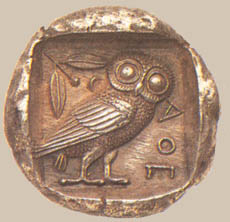
Attic coin showing Athena's Owl

